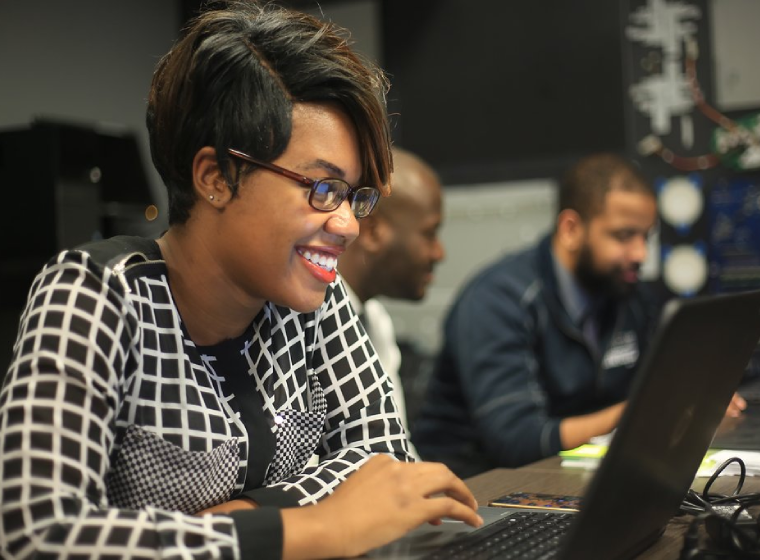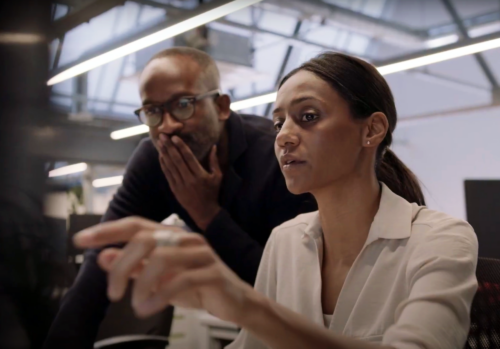
Jerome Dazzell, Graduate, Colleague and Salesforce Guru
A note from Ken Walker, Senior Vice President, Core Mission Support:
Jerome Dazzell is a Per Scholas alum who graduated valedictorian of his IT Support class in 2012, came to work for the organization for six years and is now impacting the world of data collection and research management at scale. During his time in the classroom, staff immediately recognized Jerome’s technical skills and business talent. On several occasions, when the instructor was absent for personal reasons, Jerome decided to prepare the evening before to teach the class himself. This demonstrated a tenacity for continuous lifelong learning, a fundamental characteristic within every single Per Scholas student.
Per Scholas hired Jerome after graduation and he has spent the last six years surpassing all of our expectations. The Information Technology and Information System Departments at Per Scholas have been shaped by Jerome’s work. Jerome is credited with architecting the first database Per Scholas implemented to capture student information during the admissions process and he went on to pilot and rollout Salesforce, the existing Customer Relationship Management tool that captures and manages the thousands of data points important to our work. Beyond all of this Jerome has been a kind, generous and brilliant colleague for the last six years.
Jerome has recently accepted a position as a Salesforce Developer with MDRC. Jerome is one of the thousands of Per Scholas students who will never stop learning, never stop growing and making significant contributions to the employers that are lucky enough to hire them.
Per Scholas is one of the employers who benefits immensely from the talent that comes through our doors. Many of my colleagues, the Per Scholas graduates that I work alongside everyday, are proof points of our model at work.
Here’s Jerome’s story in his own words. Thanks for your hard work – and keep working hard.
Ken Walker

I grew up in Guyana with my parents, my brother and my sister. As a family, we were taught that you don’t take anything for granted. Resources were important to us, and while I wouldn’t say I grew up in poverty, my moral compass has been driven by an awareness of the access to resources and learning opportunities that I’ve had in my life.
As a kid, I was very curious about everything. My parents did not consider my sister or myself as “normal”. We were under two years apart and we loved to experiment with anything we could get our hands on. I was seven years old when my parents got me my first Lego set, a tropical island with coconut trees and beaches that I would build over and over again. It was the first and only leggo set I ever received as a child, and it taught me that I loved to be active with my hands.
From then on, I started taking everything apart. The problem was, unlike the lego set, I never knew how to put things back together. My house was an 80s household, 80s pop culture was dominant almost everywhere. There was a song in the 80s called Midas Touch that my father sang, “everything you touch turns to gold.” My father would joke that I was the “anti- midas touch.” Everything I touched seemed to end in pieces. The stereos we had at home- I would break them apart because I was curious what was inside. The fact that I couldn’t put them back together did not bother me, but it drove my parents nuts. This was the case for record players, speakers, computers. At age ten my parents decided to start locking away all of the electronic equipment in our house so I couldn’t get my hands on it.
My parents decided to move to the United States when I was thirteen. They moved to the Bronx so that there would be more opportunities for me and my sister. It was a major decision for our family because they were both successful back home, but like many Per Scholas students, they were determined to find opportunities for our family.

In college, I chose to major in Finance and in my second year I began my first professional job in the banking industry. I was a part time teller, promoted to a personal banker and then operations manager. I was then presented with a unique opportunity to open my own financial center, and at age twenty-two, I had a staff of ten and was responsible for everything in the branch. I felt fortunate being so young to have opportunities to effectively manage people, learn to manage my own time and coach my staff to perform even better. But when the market crashed in 2008 the bank I managed was bought by JPMorgan. I worked under them for a few years before being laid off. I had a few options, but I had reached a point where I was not passionate about banking, and coupled with the stress I decided I wanted to start working with my hands again and that meant technology.
I knew I had to be certified so I started looking for the fastest way to get my foot in the door and earn certifications. While searching, I stumbled on Per Scholas and enrolled in a fifteen week training to earn my A+ and MCTS (Microsoft Office) certifications. That course was amazing for me, and I pushed myself to succeed. It made the things I did when I was younger more of a reality. But I also realized, that the skills I was learning would not be enough to sustain my entire career. At some point, these skills would be obsolete, and though I was excited to be learning, I realized that I needed to continue to learn and grow at every step in the process.
After graduation, I was presented the opportunity to work for the organization full time. I didn’t want to turn it down, there was a part of me that felt gratitude to Pe Scholas, an organization giving folks this unique opportunity to find meaningful careers. I was hired onto the Admissions team in 2012, and when I started there was no electronic system in place to intake applicants info. We used a filing cabinet that was not alphabetized and could take up to 30 minutes to find a student’s information.
I thought: there must be a better way to organize this material and encouraged the shift for the organization to Google Suite. I started exploring the capabilities of the platform and built an electronic Google form that staff could input student data into a spreadsheet. I continued to work on these types of projects, building systems that would help optimize the work of our program staff and make us a more efficient organization.
After about six months, word got around about the work I was doing and I was tasked to create an online database that would house all of our policies and procedures. This was my first opportunity to work on a national project and I advanced into a new role as Program Operations Manager.
In late 2012 we made the decision to adopt Salesforce as a Customer Relationship Management Tool and I was given another opportunity to project manage the pilot and rollout to staff. I was excited to be working with a data management platform and back to a lot of the skills I had learned in my IT Support class. I was building processes within a tech landscape, developing applications for Salesforce that were customized for our organization and the company gave me confidence to administer the platform — with every new project my skill set grew and grew and grew.
The first major policy I wrote for the organization was a data use and security policy that still exists today. In addition, I embarked on a project to partner with an external software firm for the companies first Intranet to support a growing national organization.
If there is one great thing I can say about this role is that I have fulfilled my passion for technology- and I continue to fulfill it, however, I’ve also been able to partner with teammates on non-tech initiatives. Performance management is one example where I’ve helped my team members think through how we can use tech to accomplish goals relating to culture or communications.
In my new role as a Salesforce Developer at MDRC I’ll be asked to architect their data models which means creating the blueprint for the ways they manage and report out on data. MDRC is all about research, and they are the gold standard in their industry. I feel like I can add value to their team because I have confidence and a deep understanding of the workforce landscape. From my own experience, from the experience on the Per Scholas admissions team and working on Information Systems for a provider partner, I’ll be able to understand the pain points and limitations of many of the partners that MDRC works alongside. I know right off the bat that there will be projects that I will be thrown into that I am not a master yet, which is one of the reasons I wanted to pursue this challenge.
I am sad to leave Per Scholas. I will miss the people that I’ve worked with who are some of the most amazing individuals that I’ve had the opportunity to know. The people at Per Scholas have helped me grow professionally and personally in so many ways. I am grateful for the trust that the organization has had in my capabilities and I am excited to continue to grow and contribute in this next phase of my career.
Sign up for our Monthly Impact Report
More News

Donate Now
Your support makes a powerful difference in our ability to build a technology talent training solution that creates greater access and equity.

